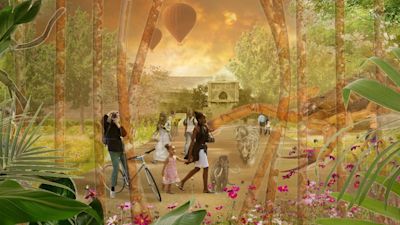Bristol could have world's first 'augmented reality zoo'

Watch Lucy McDaid's report
Bristol Zoo's site in Clifton could become the world's very first 'augmented reality zoo' if a group of creatives are successful in their bid to prevent it from being sold.
Next year, it is set to move from the historic 12-acre gardens on College Road to the Wild Place Project in South Gloucestershire.
#OurWorldBristol said the iconic site is currently under threat of being sold to a private housing development, so Bristol Zoological Society can help recover some of the financial losses made as a result of the coronavirus pandemic.
In November last year, bosses announced they needed to sell up in Bristol and move to its sister site to ensure the long-term future of the business.
But the group has set out an alternative plan for the future of the zoo, which opened to the public in 1836 and is the fifth oldest in the world.
It could now make history again, as an augmented reality zoo that sees visitors walk around the gardens wearing headsets and watching animals in their natural habitats.
The group believes this could be the solution to other struggling city zoos, that are struggling to justify keeping creatures in captivity amidst dwindling tourist numbers.
The 'augmented reality zoo' aims to provide a fully immersive experience by allowing visitors to travel in space, time and scale.
They could enter the world of insects or go back millions of years to when dinosaurs roamed the adjacent Clifton Downs.
Sir Tim Smit, the Eden Project co-founder, said: "There could be no better national or indeed global destination more suited to this project.
"#OurWorldBristol is shaping up very well and the quality of the team underlines the importance of the site, and builds on Bristol's world leading position in natural history and the media.
"We at Eden are delighted to be supporters of this adventure and truly believe it has the potential to become an international symbol of a new Green Enlightenment."
#OurWorldBristol is a collective of organisations and people who want to bring virtual education space to Bristol.
Meanwhile the CEO of Bristol Zoological Society, Dr Justin Morris, stresses that the decision to sell the site wasn't an easy one, but it has to be done.
"It was very much about fighting for survival," he told ITV West Country.
"Our responsibility is to safeguard the future of Bristol Zoological Society and that's for both the animals that we work with and the conservation and education work that we do.
"But frankly, for future generations of Bristolians and people that come from across the West of England."
He does, however, believe selling to developers could help alleviate Bristol's housing problem.
"Bristol is suffering from a really significant housing crisis that for many is incredibly problematic," he added.
"We have an opportunity here in what is already a residential neighbourhood, to deliver some more housing to help address that crisis."